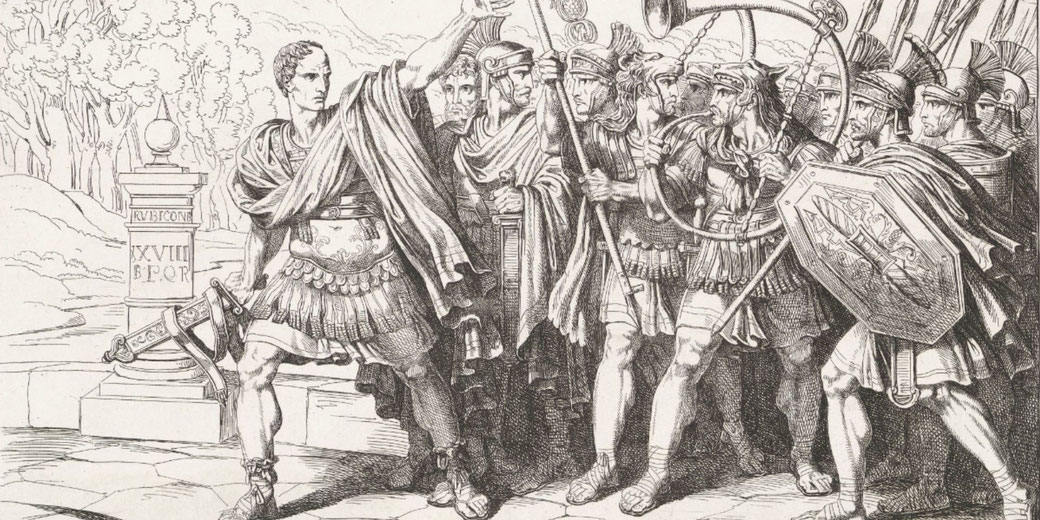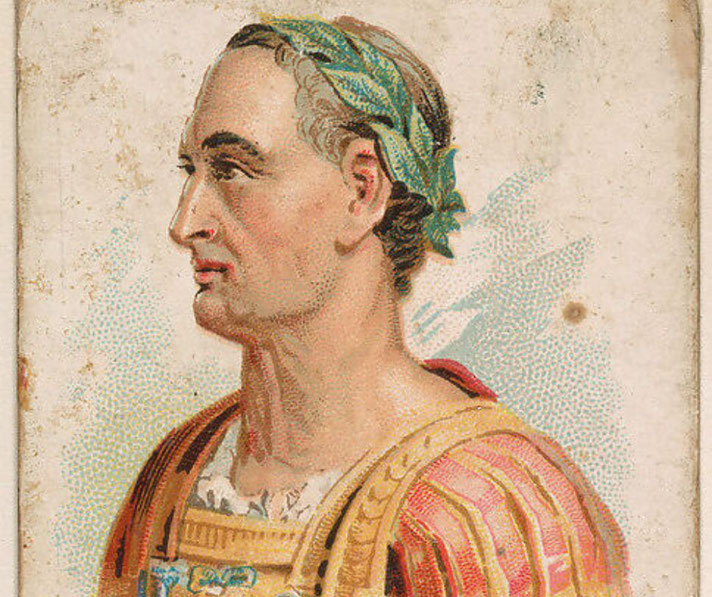Why did Julius Caesar say, 'The die is cast', when he declared war on Rome?

In January 49 BCE, Julius Caesar stood at the edge of the Rubicon River and faced a decision that would alter the fate of Rome.
The Senate had ordered him to disband his army and return as a private citizen, but he refused. Instead, as he prepared to cross into Italy with his troops, he declared, Alea iacta est ("The die is cast.")
How did Caesar become a political force in Rome?
Julius Caesar rose to power through a blend of carefully planned political alliances and repeated appeals to popular support, backed by a consistent record of military success that steadily elevated his status.
From the beginning of his public career, he positioned himself as a man who would defy the traditional constraints imposed by the Senate and expand his influence through firm but lawful methods.
Born in 100 BCE into the patrician Julian clan, Caesar aligned himself with the populares faction, which favoured reforms to benefit the lower classes.
His early career had been shaped by the violent rivalry between his uncle-by-marriage Gaius Marius and the dictator Lucius Cornelius Sulla.
When Sulla emerged victorious, Caesar’s refusal to divorce his politically inconvenient wife Cornelia placed him in danger.
He had temporarily fled Rome and had returned only after Sulla's death.
His election as pontifex maximus in 63 BCE, reportedly won through heavy spending and active campaigning, placed him at the centre of Rome’s religious life and granted him the public visibility necessary for further advancement.
When he held the highest priestly office in the Republic, he could influence both religious and political matters, which strengthened his appeal to the plebeians and to rising equestrian families eager to support a man willing to confront the Senate's control.
After he had completed his praetorship, Caesar accepted a posting as governor of Hispania Ulterior in 61 BCE.
There, he conducted a swift and profitable military campaign against rebellious tribes.
He secured considerable spoils and won the personal loyalty of his legions.
Because he used his conquests, he paid off his large debts and returned to Rome in a far stronger political position than when he had left.
To consolidate this advantage, Caesar negotiated a private alliance in 60 BCE with two of the most powerful men in the Republic, Gnaeus Pompeius Magnus and Marcus Licinius Crassus.
Known later as the First Triumvirate, this private agreement allowed the three men to control elections, get past the Senate's opposition, and direct policy in their shared interests.
The pact had formed in response to Senate resistance to their individual aims: Pompey wanted land grants for his veterans, Crassus favoured relief for the tax collectors of Asia, and Caesar needed support to secure the consulship.
As part of the deal, Caesar married his daughter Julia to Pompey and, with their backing, was elected consul in 59 BCE, during which he passed land reforms and laws that weakened the Senate’s authority and rewarded his allies.
When his consulship had ended, Caesar received a five-year military command over Cisalpine Gaul, Illyricum, and later Transalpine Gaul.
Over the next decade, he launched a series of harsh campaigns in which he defeated the Helvetii, the Belgae, and the Gallic leader Vercingetorix.
He also staged two expeditions into Britain and famously bridged the Rhine River in a show of force.
The siege of Alesia in particular showed his military skill, whereas the earlier engagement at Gergovia had ended in a costly defeat that revealed the risks of overextension in hostile terrain.
His Commentaries on the Gallic War, written in a clear, third-person narrative, portrayed his accomplishments as service to Rome rather than personal gain.
By 50 BCE, Caesar had acquired great wealth, held the loyalty of thousands of experienced soldiers, and secured a reputation as a general whose victories had far outweighed his single major defeat.
Senators who had once tolerated his aims began to fear that he would overturn the Republic and rule by force.

Why the Senate turned against Caesar
As Caesar's power continued to expand during his campaigns in Gaul, many senators became convinced that his long-term objective was to take total control of Rome.
Groups that supported Pompey began to argue that Caesar had already overstepped acceptable boundaries, and they demanded that the Senate act before he returned to Rome with his army.
Tensions escalated further when Caesar’s political allies in Rome, including the tribune Gaius Scribonius Curio, proposed that both Caesar and Pompey should give up their commands at the same time.
Although this compromise had wide popular support, the Senate, under Pompey’s growing influence, rejected it and instead demanded that Caesar disband his forces and face prosecution.
The alliance that had once united Caesar, Pompey, and Crassus had already collapsed.
Crassus had died in 53 BCE while campaigning against the Parthians at the disastrous Battle of Carrhae, and the death of Caesar’s daughter Julia, the wife of Pompey, severed the familial bond that had kept Pompey aligned with Caesar.
With no remaining loyalty to Caesar, Pompey shifted closer to the Senate and accepted extraordinary powers to defend the Republic from internal threats.
In 52 BCE, the Senate appointed Pompey as sole consul, a measure justified by the city violence that had followed the murder of Clodius Pulcher.
However, the appointment also showed that the traditional republican balance had been overturned by fear of Caesar’s return.
From that point onward, Pompey acted as the Senate’s champion, using his authority to pass laws that targeted Caesar directly and to ensure that any return to Rome would end in Caesar’s disgrace or death.
Repeated offers by Caesar to negotiate were dismissed. He proposed stepping down if Pompey did the same, but the Senate refused to consider any deal that allowed Caesar to retain influence or protect his dignitas.
By treating him as a criminal rather than as a fellow Roman magistrate, the Senate left him with no legal means of defending himself.
Through these actions, the Senate effectively closed off the constitutional path for Caesar’s return and made conflict unavoidable.
The moment Caesar crossed into Italy would become both a military invasion and a political act of defiance.
The decision at the Rubicon River
At the beginning of January 49 BCE, Caesar led the Thirteenth Legion from Ravenna south toward the Rubicon River, the boundary between his province and the Italian heartland.
Under Roman law, a general could not bring troops into Italy unless granted permission by the Senate.
Any such action would be considered a declaration of war.
By the time he reached the river, Caesar had received word that the Senate had passed the senatus consultum ultimum on 7 January, which gave Pompey power to defend the Republic.
Shortly afterward, two of Caesar's allies, Mark Antony and Gaius Scribonius Curio, had fled Rome and had arrived at his camp, where they reported the final breakdown of negotiations.
Caesar knew that if he obeyed the Senate’s order to disband his army, he would face prosecution, exile, or execution.
If he defied it, he would begin a civil war.
Accounts from Suetonius and Plutarch describe Caesar halting at the riverbank, where he hesitated and weighed the consequences of his next move.
He then declared, Alea iacta est ("The die is cast") and led his men across the Rubicon.
Suetonius also records that Caesar may have originally spoken the phrase in Greek: ανερρίφθω κύβος (anerriphtho kubos), a popular expression from the comic playwright Menander.
The phrase, taken from gambling, conveyed the sense of a final outcome. Once cast, dice cannot be recalled. Once crossed, the Rubicon could not be uncrossed.
As his army moved through Italy, many towns surrendered without resistance.
Local officials opened their gates, citizens cheered his arrival, and Pompey, caught off guard, retreated south to Brundisium.
From there, he crossed to Greece in mid-March with several legions and many senators, and he intended to regroup and fight Caesar on foreign soil rather than risk a battle on Italian ground.
The Senate’s authority fell apart in Caesar’s wake. In less than two months, Caesar had captured the Italian peninsula, taken control of Rome, and forced his opponents to flee.
Did Caesar’s gamble pay off?
The civil war that followed Caesar’s decision at the Rubicon ended with the collapse of senatorial resistance and with most power falling to one man.
Although the risk had been immense, Caesar had judged correctly that his army’s loyalty, his popularity among the people, and the disunity of his enemies would give him the upper hand.
After he had secured Italy, Caesar pursued Pompey across the Adriatic. Naval blockades slowed his reinforcements, and his troops suffered shortages, but he managed to land in Epirus and keep pressure on his enemies.
At the Battle of Pharsalus in August 48 BCE, his forces defeated a larger army commanded by Pompey himself.
Although outnumbered, Caesar relied on disciplined veterans and a flexible strategy that exploited his opponent’s errors.
Pompey fled to Egypt, where Ptolemaic agents who hoped to win Caesar’s favour murdered him.
In the years that followed, Caesar campaigned in Egypt, Pontus, Africa, and Hispania, where he defeated every rival faction that challenged his rule.
When he defeated Pharnaces II of Pontus at the Battle of Zela in 47 BCE, he famously reported his swift victory with the words, Veni, vidi, vici (“I came, I saw, I conquered”).
By 45 BCE, he had stood unopposed and had returned to Rome. In February of the following year, the Senate appointed him dictator perpetuo, a title that confirmed his permanent control over the Republic.
Despite the victory, discontent festered. Caesar’s collection of honours, together with the centralising of power that pushed the Senate aside, alienated many traditionalists.
On the Ides of March in 44 BCE, a group of senators led by Brutus and Cassius assassinated him in the Theatre of Pompey, hoping to restore the Republic.
However, their actions unleashed further chaos, leading to another round of civil wars and eventually to the creation of the Roman Empire under Augustus.
Caesar’s will named his great-nephew Octavian as his adopted son and heir, and in 43 BCE, Octavian joined Mark Antony and Lepidus in forming the Second Triumvirate, which crushed the assassins at Philippi in 42 BCE.
Ultimately, Caesar's choice lead to military triumph and political supremacy, it concluded with his assassination.
The gamble succeeded, but it destroyed the Republic and opened the way for imperial rule.
What do you need help with?
Download ready-to-use digital learning resources
Copyright © History Skills 2014-2025.
Contact via email
With the exception of links to external sites, some historical sources and extracts from specific publications, all content on this website is copyrighted by History Skills. This content may not be copied, republished or redistributed without written permission from the website creator. Please use the Contact page to obtain relevant permission.





